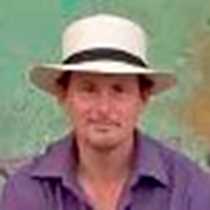At Sea off Argentina
And so we reach our last day at sea, the final leg of a remarkable voyage that has taken us from a rainy afternoon in Lisbon to the flowering streets of Funchal, the sun-drenched banana plantations in the Canary Islands, the colourful West African bustle of the Cape Verde archipelago, and then on to South America. We’ve crossed the Equator and both tropics and are sailing now into Patagonia – a true Atlantic Odyssey, two thousand leagues in all, or about seven thousand statute miles if you want to reckon it in landsman’s terms.
“To travel hopefully is better than to arrive,” wrote Robert Louis Stevenson. Certainly we travelled hopefully – crowding on the decks of an evening and hoping to see the green flash at sunset, and by day with hopes of seeing whales and dolphins and sea birds. And our hopes were amply, even generously, rewarded – up close and personal sightings of the extremely rare monk sea in Madeira, the unexpected spectacle of a pod of killer whales playing in the middle of the Atlantic, breaching humpbacks, sperm whales and southern rights. There were flying fish and booby birds and albatrosses hovering off the bow. Even the elusive green flash cooperated.
These so-called empty days at sea passed agreeably and on this, our last sea day, there was much head-shaking marvel among us about where had the time gone? “I love these days,” one remarked; “I could go on like this for weeks,” said another.
Yes, to travel hopefully is a delight. But better than to arrive? Well, as far as I know Robert Louis Stevenson, veteran traveller that he was, never reached the Valdez Peninsula, in Argentine Patagonia, where we land tomorrow and so he never got to see and experience its spectacular landscapes and glorious profusion of wildlife. If he had, I suspect he might have changed his mind.
And so we reach our last day at sea, the final leg of a remarkable voyage that has taken us from a rainy afternoon in Lisbon to the flowering streets of Funchal, the sun-drenched banana plantations in the Canary Islands, the colourful West African bustle of the Cape Verde archipelago, and then on to South America. We’ve crossed the Equator and both tropics and are sailing now into Patagonia – a true Atlantic Odyssey, two thousand leagues in all, or about seven thousand statute miles if you want to reckon it in landsman’s terms.
“To travel hopefully is better than to arrive,” wrote Robert Louis Stevenson. Certainly we travelled hopefully – crowding on the decks of an evening and hoping to see the green flash at sunset, and by day with hopes of seeing whales and dolphins and sea birds. And our hopes were amply, even generously, rewarded – up close and personal sightings of the extremely rare monk sea in Madeira, the unexpected spectacle of a pod of killer whales playing in the middle of the Atlantic, breaching humpbacks, sperm whales and southern rights. There were flying fish and booby birds and albatrosses hovering off the bow. Even the elusive green flash cooperated.
These so-called empty days at sea passed agreeably and on this, our last sea day, there was much head-shaking marvel among us about where had the time gone? “I love these days,” one remarked; “I could go on like this for weeks,” said another.
Yes, to travel hopefully is a delight. But better than to arrive? Well, as far as I know Robert Louis Stevenson, veteran traveller that he was, never reached the Valdez Peninsula, in Argentine Patagonia, where we land tomorrow and so he never got to see and experience its spectacular landscapes and glorious profusion of wildlife. If he had, I suspect he might have changed his mind.




